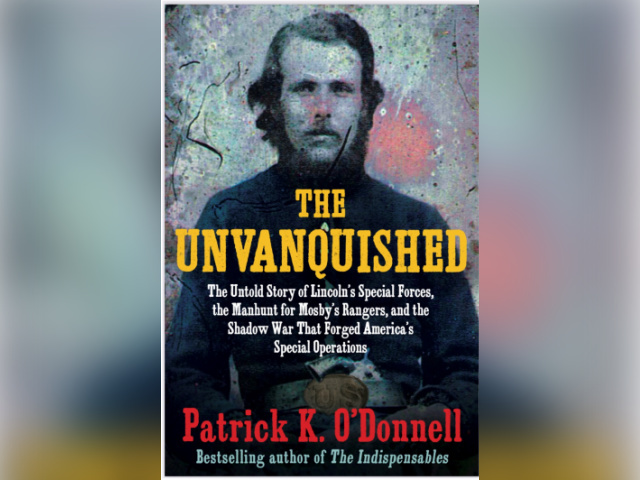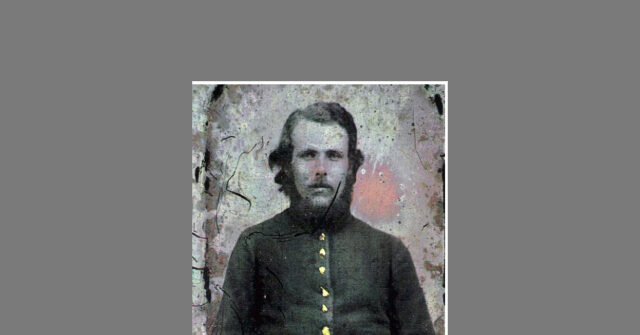This weekend, Americans will dedicate a day to honor the memory of those who sacrificed their lives in defense of their country: Memorial Day. Although the federal holiday was officially established in 1968, its origins date back more than 160 years to the Civil War. During this time, a grieving nation sought to commemorate the many brave men lost in the brutal conflict. One soldier who has never come home is Sergeant Joseph Allen Frith.
Frith was a handsome, twenty-three-year-old, gray-eyed farmer who joined Richard Blazer’s Scouts, Lincoln’s Special Forces, from the 34th Regiment Ohio Volunteer Infantry. His fellow soldiers described him as “always ready for anything, and always in good humor,” and he had many friends, which was indicative of the esprit de corps and cohesion within the unit. Lincoln’s Special Forces, also known as Jessie Scouts, not only led the Union armies in battlefield reconnaissance but also tracked the South’s most dangerous men, forming one of the first hunter-killer teams in the U.S. Army. To hunt their prey—Confederate guerrilla leader John Singleton Mosby and his Rangers—the Union Scouts donned Confederate butternut uniforms and engaged in irregular warfare.
Civil War, Picket Duty In Virginia. The scene shows Union troops in blue uniforms firing with rifles over a fence, from their position in a wood. The Union troops are shown standing, crouching and kneeling, firing or standing at-the-ready with their rifles, whilst an officer looks on from behind. Their target is a Confederate column of cavalry which is crossing the field in front of them. One of their horses, its rider lying on the ground, is bolting. A farmhouse and a road is discernible in the background, Albert Bierstadt/Century Association.
On a summer day in June 1864, Frith and his fellow Scouts stumbled upon a party of Confederates. A violent firefight on horseback ensued, men on both sides were wounded and killed before the Confederates fled. Firth sustained a fatal bullet in the back from a young untrained fellow Union soldier, a clerk who had “no business” riding with the Scouts and who carelessly carried his “revolver in hand, directly in the rear of Joe. His horse stumbled and fell, causing the discharge of his pistol. The ball entered poor Joe’s back coming out at the pit of his stomach.” In a letter informing Frith’s father of his death, fellow Scout said Frith “spoke of his mother frequently and wanted to let her know he died like a soldier.” The following evening, at a nearby farmhouse owned by a Mrs. Dickinson or Dickson likely in Covington, Virginia, despite a surgeon’s care, “At seven o’clock he folded his arms across his breast, turning over on his side, and seemed to fall asleep—he was gone to his rest.”
The previously untold story of Frith and the remarkable stories of many other brave Civil War covert warriors are told in my bestselling book, The Unvanquished: The Untold Story of Lincoln’s Special Forces, the Manhunt for Mosby’s Rangers, and the Shadow War That Forged America’s Special Operations. The book reveals the drama of irregular guerrilla warfare that altered the course of the Civil War, including the story of Lincoln’s special forces who donned Confederate gray to hunt Mosby and his Confederate Rangers from 1863 to the war’s end at Appomattox—a previously untold story that inspired the creation of U.S. modern special operations in World War II as well as the story of the Confederate Secret Service.

Bestselling author Patrick K. O’Donnell’s “The Unvanquished: The Untold Story of Lincoln’s Special Forces, the Manhunt for Mosby’s Rangers, and the Shadow War That Forged America’s Special Operations”
Joseph Frith’s body was buried behind the Dickson house “with the honors of a soldier….in as good form as the circumstances would allow.” Like many of his fellow covert warriors who left home to defend their country and never returned, Frith’s grave tragically remains unknown. “Poor Joe. His death has left a vacancy in his regt, that can never be filled…I don’t think there was a man in the regt who had more friends, or whose loss could be more regretted.”
Johannes Adam Simon Oertel , 1866. Title: The Union Scout, Public Domain
The exact origin of Memorial Day is disputed, but the tradition of strewing the graves of fallen soldiers with flowers to honor their sacrifice and memory started in both the North and South immediately after the close of the Civil War. In the South, it was particularly the women, the Ladies Memorial Association of Columbus, Georgia, among others, that sought to honor and remember the fallen in what would become known as Decoration Day. In the North, the veterans led the way with one veterans’ group, The Grand Army of the Republic, explicitly stating that the practice should “be kept up year to year, while a survivor of the war remains to honor the memory of his departed comrades.” After World War I, the practice expanded to honor all American veterans who have given their lives in battle, and today, some have even further expanded it to include all veterans who have passed away.
Frith’s father reflected on Joseph’s death, the second son he had lost during the war, in a letter printed in his hometown newspaper in Milan, Ohio, with these powerful words directed to the soldier’s childhood friends and his brother’s in arms: “In his own pure and unselfish life, he taught you a lesson how to live, and in his calm composure in the hour of death, he has left you his example of how to die.” We do well to remember.
Note: Efforts are underway by the author to find the final resting place of Sgt. Frith. Those who may have information are encouraged to contact the author @combathistorian.
Patrick K. O’Donnell is a bestselling, critically-acclaimed military historian and an expert on special operations units. He is the author of thirteen books, including his new bestselling book on the Civil War The Unvanquished: The Untold Story of Lincoln’s Special Forces, the Manhunt for Mosby’s Rangers, and the Shadow War That Forged America’s Special Operations, is currently in the front display of Barnes & Noble stores nationwide. O’Donnell’s other bestsellers include: The Indispensables, The Unknowns, and Washington’s Immortals. He served as a volunteer combat historian in a Marine rifle platoon during the Battle of Fallujah and often speaks on espionage, special operations, and counterinsurgency. He has provided historical consulting for DreamWorks’ award-winning miniseries Band of Brothers and documentaries produced by Fox, the History Channel, and Discovery. PatrickKODonnell.com @combathistorian
Read the full article here


